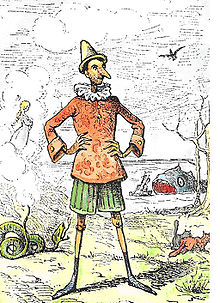 Overcast this early Tuesday on California’s north coast, as we await another round of rain forecast for this afternoon, and seemingly the wet stuff slated for near-about the next 10 days.
Overcast this early Tuesday on California’s north coast, as we await another round of rain forecast for this afternoon, and seemingly the wet stuff slated for near-about the next 10 days.
Meanwhile, a new study shows lying becomes easier the more you lie. Glaring example — Donald Trump, at least in public for a week in late September, lied at a rate of ‘one untruth every 3.25 minutes.’
The latest — this morning from the Washington Post: ‘By getting the timeline wrong and exaggerating the connections, Trump ends up in Three-Pinocchio range. But then, as he often does, Trump pushes the envelope and makes the unsupported claim that Clinton knew about the payments. It’s almost like he can’t help himself. That tips his statement about the Wall Street Journal article into Four-Pinocchio territory.’
(Illustration: ‘Pinocchio,’ by Enrico Mazzanti, found here).
T-Rump, ‘as he often does,’ mangled news reports of a federal investigation into fuzzy-detailed aspects of Virginia Gov. Terry McAuliffe’s political contributions — McAuliffe is a longtime Hillary Clinton supporter.
Hence, the subject of a T-Rump speech/rant that ventured into ‘Four-Pinocchio territory.’
Also a classic run of crazy lying asshole — the new research indicates T-Rump a pathological liar.
Also from the Washington Post, but yesterday:
Neuroscientists at the University College London’s Affective Brain Lab put 80 people in scenarios where they could repeatedly lie and get paid more based on the magnitude of their lies.
They said they were the first to demonstrate empirically that people’s lies grow bolder the more they fib.
The researchers then used brain scans to show that our mind’s emotional hot spot — the amygdala — becomes desensitized or used to the growing dishonesty, according to a study published online Monday in the journal Nature Neuroscience .
“You can think of this as a slippery slope with what begins as small acts of dishonesty escalating to much larger ones,” said study lead author Neil Garrett , now a neuroscience researcher at Princeton University.
“It highlights the potential dangers of engaging in small acts of dishonesty on a regular basis because these can escalate to much larger ones further down the line.”
And during this lying, brain scans that show blood supply and activity at the amygdala decrease with increasing lies, said study co-author and lab director Tali Sharot.
“The more we lie, the less likely we are to have an emotional response” — say, shame or guilt — “that accompanies it,” Sharot said.
Probably the most-troubling aspect:
It shows people’s brains adapting to their own wrongdoing.
It was so noticeable that the researchers were able to predict growing dishonesty based on the dropping activity in the amygdala.
T-Rump deep-drops with no bottom — via Vox last month on Trump and his lying:
This is the point. Donald Trump lies. All the time.
He doesn’t just stretch the truth in the way most politicians do: selectively citing facts that make them look good, deliberately omitting ones that make them look bad, overstating or understating the probable impact of the campaign promises they make.
No, he just says things that aren’t true.
And he knows it. Sometimes it’s something big — a conspiracy theory to excuse his global-warming denialism.
Sometimes it’s so minor that its unnecessariness makes it all the more infuriating.
And LiveScience on the bodily functions:
“Pathological liars have a pattern of frequent, repeated and excessive lies or lying behavior for which there is no apparent benefit or gain for the liar,” said Charles Dike, clinical professor of psychiatry at Yale University and medical director of the Whiting Forensic Division of Connecticut Valley Hospital.
Two weeks from today, hopefully one of the most-vile, lying-pieces-of-shit seen in generations will return to his tower a yuuge loser…